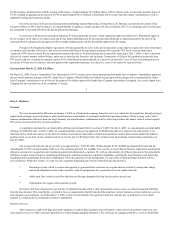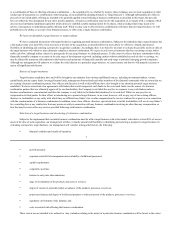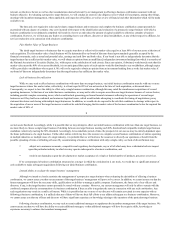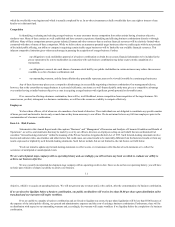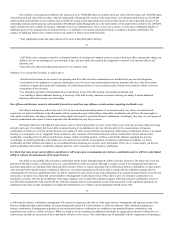Jamba Juice 2006 Annual Report Download - page 14
Download and view the complete annual report
Please find page 14 of the 2006 Jamba Juice annual report below. You can navigate through the pages in the report by either clicking on the pages listed below, or by using the keyword search tool below to find specific information within the annual report.
If our initial stockholders exercise their registration rights, it may have an adverse effect on the market price our common stock and the existence
of these rights may make it more difficult to effect a business combination.
Our initial stockholders are entitled to demand that we register the resale of their shares of common stock at any time after the date on which their
shares are released from escrow, which, except in limited circumstances, will not be before June 29, 2008. If our initial stockholders exercise their registration
rights with respect to all of their shares of common stock, then there will be an additional 3,750,000 shares of common stock eligible for trading in the public
market. The presence of this additional number of shares of common stock eligible for trading in the public market may have an adverse effect on the market
price of our common stock. In addition, the existence of these rights may make it more difficult to effectuate a business combination or increase the cost of the
target business, as the stockholders of the target business may be discouraged from entering into a business combination with us or request a higher price for
their securities as a result of these registration rights and the potential future effect their exercise may have on the trading market for our common stock.
The American Stock Exchange may delist our securities from quotation on its exchange which could limit investors’ ability to make transactions
in our securities and subject us to additional trading restrictions.
Our securities are listed on the American Stock Exchange, a national securities exchange, and have been since the consummation of the initial public
offering. We cannot assure you that our securities will continue to be listed on the American Stock Exchange in the future prior to a business combination.
Additionally, in connection with our business combination, it is likely that the American Stock Exchange may require us to file a new initial listing
application and meet its initial listing requirements as opposed to its more lenient continued listing requirements. We cannot assure you that we will be able to
meet those initial listing requirements at that time.
If the American Stock Exchange delists our securities from trading on its exchange, we could face significant material adverse consequences
including:
• a limited availability of market quotations for our securities;
• a determination that our common stock is a “penny stock” which will require brokers trading in our common stock to adhere to more
stringent rules and possibly resulting in a reduced level of trading activity in the secondary trading market for our common stock;
• a limited amount of news and analyst coverage for our company; and
• a decreased ability to issue additional securities or obtain additional financing in the future.
If we are deemed to be an investment company, we may be required to institute burdensome compliance requirements and our activities may be
restricted, which may make it difficult for us to complete a business combination.
If we are deemed to be an investment company under the Investment Company Act of 1940, our activities may be restricted, including:
• restrictions on the nature of our investments; and
• restrictions on the issuance of securities,
which may make it difficult for us to complete a business combination.
In addition, we may have imposed upon us burdensome requirements, including:
• registration as an investment company;
• adoption of a specific form of corporate structure; and
• reporting, record keeping, voting, proxy and disclosure requirements and other rules and regulations.
18
We do not believe that our anticipated principal activities will subject us to the Investment Company Act of 1940. To this end, the proceeds held in trust may
only be invested by the trust agent only in Treasury Bills issued by the United States with a maturity of 180 days or less or in money market funds meeting
certain conditions under Rule 2a-7 promulgated under the Investment Company Act of 1940. By restricting the investment of the proceeds to these
instruments, we intend to meet the requirements for the exemption provided in Rule 3a-1 promulgated under the Investment Company Act of 1940. If we were
deemed to be subject to the act, compliance with these additional regulatory burdens would require additional expense that we have not allotted for.
Because we may be deemed to have no “independent” directors, actions taken and expenses incurred by our officers and directors on our behalf
will generally not be subject to “independent” review.
Each of our directors owns shares of our common stock and, although no salary or other compensation will be paid to them for services rendered
prior to or in connection with a business combination, they may receive reimbursement for out-of-pocket expenses incurred by them in connection with
activities on our behalf such as identifying potential target businesses and performing due diligence on suitable business combinations. There is no limit on the
amount of these out-of-pocket expenses and there will be no review of the reasonableness of the expenses by anyone other than our board of directors, which
includes persons who may seek reimbursement, or a court of competent jurisdiction if such reimbursement is challenged. Because none of our directors may
be deemed “independent,” we will generally not have the benefit of independent directors examining the propriety of expenses incurred on our behalf and
subject to reimbursement. Although we believe that all actions taken by our directors on our behalf will be in our best interests, we cannot assure you that this
will be the case. If actions are taken, or expenses are incurred that are not in our best interests, it could have a material adverse effect on our business and
operations and the price of our stock held by the public stockholders.


